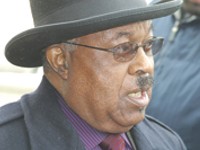News Briefs 6.4.03
[
{
"name": "500x250 Ad",
"insertPoint": "5",
"component": "15667920",
"parentWrapperClass": "",
"requiredCountToDisplay": "1"
}
]
Like an ex-smoker who breaks down and buys a pack of Camels in a moment of stress, Monroe County Executive Jack Doyle wants to dip into the county's tobacco settlement money to pay for general operating expenses this year and cover last year's deficit.
In 2000, Doyle sold the rights to the county's share of future tobacco settlement money (as much as $725 million) in exchange for $142.5 million in cash. That money, as required by law at the time, could only be used without penalty to fund future capital projects or relieve debt the county owed on past projects. The county then earmarked some of those funds to expand the county jail, build new facilities for Monroe Community College, and finance, with state help, construction of a juvenile justice center.
Since then, federal tax laws have been amended to allow tobacco settlement funds to be used for general operating expenses without penalty. The county expects it will have to cover a nearly $19 million deficit from last year. It also projects that its operating budget will fall short by about the same amount this year. So Doyle has decided it'd be wise to take $36 million out of the $142.5 million capital project/debt-relief pot and use it to help close those existing and anticipated deficits.
Before that can happen, the county legislature must approve an amendment to the 2000 local law that dictates how tobacco money can be spent. The matter goes before the Ways & Means Committee on June 4, and is expected to be considered by the full lej when it convenes June 10.
In his formal request for the amendment, Doyle wrote that given the state's fiscal crunch, the prospect Albany will provide funds for a juvenile justice facility is "doubtful at this time." So he'd use $15 million the county previously set aside for that as-yet-unrealized project to help cover the deficits. (County officials say they haven't abandoned the idea of the center, but may create it in an existing facility, rather than build a new one.)
The rest of the $36 million, however --- $1 million for new MCC facilities and $20 million for the jail expansion --- has already been allocated for the MCC and jail projects. So the county would have to borrow $21 million to replace that previously allocated money. The availability of "historically low interest rates," Doyle writes, makes this borrowing an attractive option.
Though Doyle didn't spell it out, the unattractive option would be to slash county spending and services, raise property taxes, or do both this year to cover the deficits. That option is especially ugly given the fact the county exec seat is up for grabs this November in what's shaping up to be a tough race.
Last summer, when budget projections forecasted huge gaps for 2002 and 2003, Doyle proposed sweeping spending cuts and layoffs that provoked heavy criticism from citizens, social service agencies, cultural organizations, political opponents and former allies alike. A property tax increase was passed, over his objections, in an attempt to soften the blow. But that modest increase is clearly not enough to balance the county's books. By reallocating the tobacco money now, and covering the costs it was to pay for with future borrowing, Doyle may be able to avert a similar crisis this election year.
"For obvious reasons, it would be good get all this bad news out this year," says Republican County Legislator Ray Santirocco, who broke with Doyle and his party's caucus last year to help pass the bipartisan budget that raised property taxes.
"They're desperate," Democratic legislator Jay Ricci says of the Republican administration. "They're putting off facing reality until after the election."
Doyle's proposed reallocation "shows that his budget was way out of whack for this year," Ricci says. "The money that we added, while it was painful to increase taxes, looks like it was absolutely necessary."
Henrietta's Republican revolt
At the tail end of May, a clear majority of Henrietta Republican committee members turned against their longtime standard-bearer, incumbent Town Supervisor James Breese. By a vote of 58-45, they chose challenger Jack Driscoll, a former town board member and current county legislator, to be their 2003 candidate for supervisor.
The stage thus is set for a September Republican primary.
Breese, who's held the office for going on two decades, isn't going away quietly. "It's what you call old-fashioned insider politics," he says. Driscoll, he says, "got his friends together" to swing the vote. "It's a personal thing [with Driscoll]," says Breese. "He wants this job. My problem is, the 7,000 Republicans out there ought to have a say in this."
Breese is known for speaking out. "I never said I'm warm and fuzzy," he says. "I'm decisive." But are there matters of substance to argue about? Not according to Breese: "This is a kind of weird situation out here, because there aren't any issues."
The challenger sees another reality. Breese, says Driscoll, "thought the process was great for nine straight times; now he thinks it's 'stacked.' He's reached the point where he feels entitled [to the office]." Driscoll adds he recommended only two people for committee membership.
Driscoll promises to raise land-use as a campaign issue. "We need to start paying attention to the quality of life" in Henrietta, he says. "We ought to have music in the park in our natural amphitheater," he says, referring to one feature of the town park on Calkins Road. "I was the guy, when I was still on the town board, who formed the Land Use Committee," he says. A document prepared by that committee, he says, became the basis of Henrietta's comprehensive plan.
Any common ground in the Breese-Driscoll debate? "We're both fiscally responsible types," says Driscoll. "We need a healthy tax base."
Hemlock gets a trim
A reader alerted us that work crews were hauling logs out of some forested land on the east side of Hemlock Lake, around 30 miles south of Rochester.
Ordinarily, that would be nothing unusual. But the land in question belongs to the City of Rochester, and the city's observing a logging moratorium in certain parts of the Hemlock-Canadice lakes watershed, a prime source of the municipal water supply for more than a century. The moratorium, a concession to environmentalists, is supposed to keep loggers far away from some stands of old-growth trees till next year, at least.
But the current logging has nothing to do with the old growth or the moratorium, according to Ed Doherty, head of the city's Environmental Service Department.
Doherty says three forested areas west of Hemlock Lake are being thinned right now. Logging crews, he says, "are removing red pines that were planted about 80 years ago and that are stressed." (Indeed, many stands of conifers are "monocultures" --- plantings of a single species --- and are subject to die-off and deterioration.) And the crews are re-planting the cuts with oak seedlings to promote a mix of native hardwoods, he says.
Is there a profit motive? "We may get net revenue," says Doherty. "But we seldom do."
Doherty suggests the moratorium will be extended: "Unless we determine there are environmental benefits [to logging nearer the old-growth], we will continue to defer on this."
The 411 on 911
Something to consider when trying to decide between cell-phone and residential-phone service: the negative impact the cell-phone craze has had on 911 service.
Because of increased cell-phone usage, and the popularity of dedicated high-speed Internet access, there are 33,632 less "landlines" in Monroe County than there were in 1999. And a primary funding stream for the Monroe County 911 Center has been a $.35 monthly 911 fee on all landlines.
"We've been losing about $18,000 a month, which is just over $1 million since 1999," says 911 Center Director John Merklinger. "This is money that's strictly dedicated to the day-to-day operation of 911."
Merklinger says the Center is averaging about $1.6 million in annual revenue from the surcharge. "But our operating budget is $10.2 million," he says. "So it doesn't even come close to covering the operating expenses. And it continues to decrease. I don't know if there is anything we can do to address this. We've talked about it, but unless people go get a phone, we're stuck."
This cell-phone problem was one of many budgetary issues Merklinger presented to City Council during its budget hearing for emergency services on Tuesday, May 27.
The remaining budget hearings include: Environmental Services on Friday, June 4, at 4 p.m., and the City School District on Wednesday, June 11, at 4 p.m. followed by a public hearing at 7:30 p.m. City Council is expected to vote on the budgets at its regular meeting on June 17 at 7 p.m. All meetings are in City Council Chambers at City Hall. Info: 428-7538.
Taxing logic
On May 23, the House passed what US Representative Jim Walsh afterward called "a monumental $350 billion economic stimulus package that will offer significant tax cuts to American families and small businesses and provide much-needed federal funding to states." (It's actually more monumental than that. Various sources estimate the total at $800 billion or more.)
Walsh, a Republican whose district includes the northeastern portion of Monroe County, was not alone locally in voting for the package. Republicans Tom Reynolds and Amo Houghton also voted yes; only Democrat Louise Slaughter said no. (US Senators Hillary Rodham Clinton and Chuck Schumer, both Democrats, voted against the Senate version.)
Walsh is correct about the state connection: The package provides $20 billion total over two years to the states. New York stands to gain around $2 billion total --- about three-quarters of it going toward Medicaid. Of course, as the Bush administration and many other conservatives have dared to brag, most of the cash is going to rich people, not the states.
"More than two-thirds of the... cuts will go to the best-off 10 percent, and well over half will go the top 5 percent," says an analysis by Citizens for Tax Justice, a Washington-based group. A CTJ chart shows the lowest 20 percent of taxpayers will get back $45 from 2003 to 2006 --- not even $45 per year, but $45 total for the four years. This bottom quintile's average share of the total tax cut for the period is 0.3 percent.
Moreover, as news reports now indicate, many low-income people won't be getting a much-touted increase in the child credit. Regardless, their children and children's children will be asked to pay off $44 trillion in predicted cumulative deficits, as reported in the Financial Times and other publications now seemingly radical compared to US economic policy.
Rep. Walsh stands by his vote. Spokesperson Dan Gage concedes "there are issues we'll have to deal with," that is, deficits and debt. (Some Bush advisers say we'll have to deal by "reforming" social programs, for example, by cutting and/or privatizing Social Security and Medicare.)
"In the Congressman's mind, we can't sit idle," says Gage. "Hopefully," he says, "we'll have the same economic boom as we did in the 1980s" after the Reagan cuts.
Gage believes everything's fair and simple. "The more taxes you pay, " he says, "the better your tax cut will be."
Batter up
The Rochester Hispanic Youth Baseball League is opening its eighth season with a parade and a full slate of games on Saturday, June 7. The parade will start at the Puerto Rican Youth Development and Resource Center, 997 North Clinton Avenue, at 10 a.m. and wind up at Don Samuel Torres Park, corner of Oakman Street and North Clinton, at around 12 p.m. The season's inaugural games will start later that afternoon.
Correcting ourselves
In our schedule for the Rochester International Jazz Festival, published in last week's festival guide, guitarist Rik Emmett should be listed as playing the Water Street Music Hall on Saturday, June 7, at 9 p.m. Emmett is not playing at the Memorial Art Gallery.








